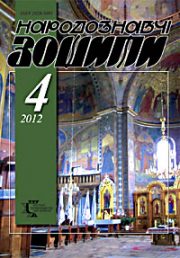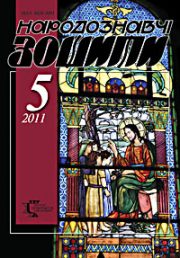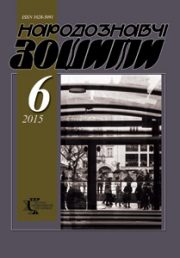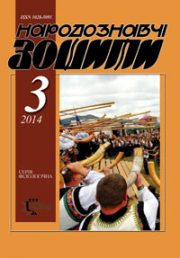The Ethnology Notebooks. 2021. № 5 (161), 1123—1136
UDK 39(477.81/.82+476):634.73
DOI https://doi.org/10.15407/nz2021.05.1123
CALENDAR REGULATION OF CRANBERRIES HARVESTING IN RIGHT-BANK OF POLISSIA: TRADITIONS AND MODERNITY
DMYTRENKO Alla
- ORSID ID: https://orcid.org/0000-0001-6125-8628
- Candidate of History, Docent,
- Lesya Ukrainka Volyn National University,
- Department of museum and monument studies,
- Information and Analytical Activities,
- Volia Avenue, Lutsk, 43000, Ukraine
- Contacts: e-mail: dmytrenko.a@gmail.com
Abstract. Based on the field ethnographic materials collected during historical and ethnographic expeditions (2005—2014), organized by the State Scientific Center for the Protection of Cultural Heritage from Technological disasters and the Museum of Ethnography of Volyn and Polissia at Lesya Ukrainka’s Volyn National University the traditions that have developed in the system of calendar regulation of cranberry harvesting in the Right-bank Polissia and the changes caused by the mass harvesting of these berries in recent decades are highlighted. It is noted that the terms of harvesting cranberries are extremely blurred, which is caused primarily by the biological characteristics of this berry, which has a long vegetative period and is well preserved, so it can be harvested from late summer to spring next year. In some places, the beginning of cranberry harvesting is associated with the development of other plants (reaching the viburnum).
The second factor influencing the timing of the harvest of cranberries was determined by the people’s agricultural calendar, which clearly defined the timing of all chores that were most often tied to a particular holiday. Speaking of cranberries, such points of reference for the harvest were traditionally Golovosiky, Zdvyzhennia, The Second Pure, the Protection of Virgin Mary, and even St. Michael. At the same time, a factor such as potato digging is imposed on these holidays. Harvest cranberries began after completion of these works. The third factor that has dramatically influenced the timing of cranberry harvesting in recent decades is the collapse of collective farms, widespread rural unemployment — on the one hand, and high demand for cranberries by reapers, forcing them to choose more green berries. The possibility of not just additional, but often basic earnings encourages Polissia’s farmers to choose more green berries. In this regard, the reapers determine the date of reception of cranberries. In the villages whose inhabitants collect berries in the Belarusian forests, the length of the season is determined by interstate agreements.
So, we can speak not only about the change in the timing of harvesting cranberries, but also about the change of its role in the structure of the modern agriculture of the rural population of the Right-bank Polissia. Along with blueberries and, to a lesser extent, other berries, cranberries «feed» rural families.
Keywords: ethnic culture, traditional ecological culture, traditional farming, harvesting, berries, cranberries, custom rules, people’s (folk) calendar, Right-bank of Polissia.
Received 5.07.2021
REFERENCES
- Dmytrenko, A., Sliuzinska, R., & Pshenichkina, H. (2016). Calendar regulation of the beginning of the berry season in the Right-Bank of Polesie of Ukraine. Tradicija ir dabartis / Tradition & Contemporarity. Scientific works (Vol. 11, pp. 105—120). Klaipeda: Klaipeda University Publishers [in Russian].
- (2012). Blueberry pickers fined over UAH 11000 on Ukrainian-Belarusian border. Retrieved from: http://rtb.rv.ua/company/tele/news/2012/07/10/zbiralnikiv-chornici-na-ukrayinsko-biloruskomu-kor/ (accessed 18 October 2018) [in Ukrainian].
- (2017). Simplified transition for collecting wild plants. Retrieved from: http://prosvit.org/спрощений-перехід-кордону-для-збору-д/ (accessed 18 October 2018) [in Ukrainian].
- (2019). The Ukrainian-Belarusian border was opened for the pickers of berries and mushrooms. Retrieved from: https://www.volyn24.com/news/129945-ukrainsko-biloruskyj-kordon-vidkryly-dlia-zbyrachiv-iagid-ta-grybiv (accessed 20 January 2020) [in Ukrainian].
- (2008). 48 children and 9 adult Ukrainians attempted to enter Belarus illegally. Retrieved from: https://zaxid.net/48_ditey_i_9_doroslih_ukrayintsiv_namagalisya_nezakonno_potrapiti_u_bilorusiyu_n1056262 (accessed 18 October 2018) [in Ukrainian].
- (2017). In the Stolin district, there are regular detentions and deportations of berry pickers. Retrieved from: http://prosvit.org/в-столинському-районі-чергові-затрим/ (accessed 18 October 2018) [in Ukrainian].
- Dmytrenko, A. (2009). Harvesting. Etnoculture of Rivne Polissia (Pp. 64—72). Rivne: PP DM [in Ukrainian].







